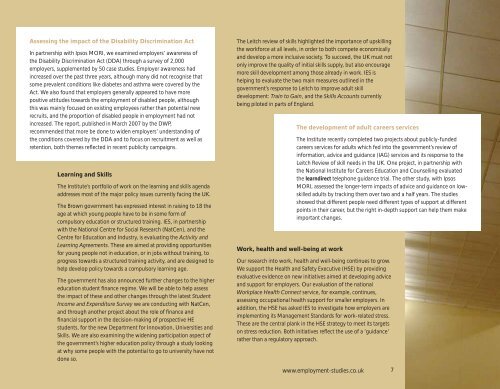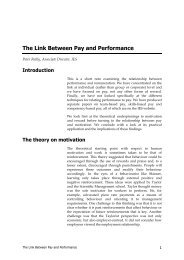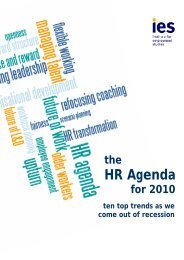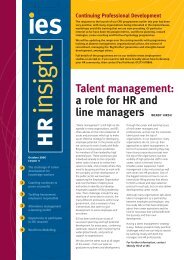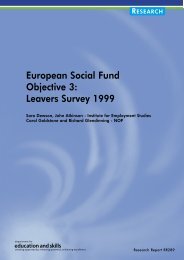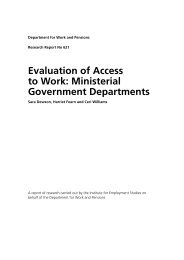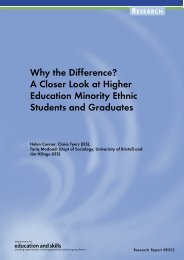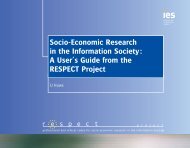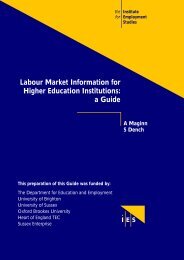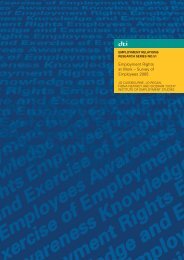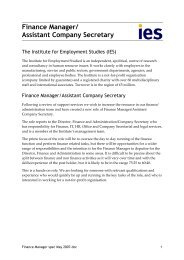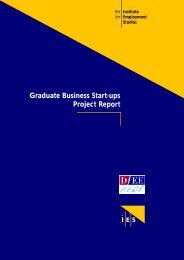PDF of this item - The Institute for Employment Studies
PDF of this item - The Institute for Employment Studies
PDF of this item - The Institute for Employment Studies
You also want an ePaper? Increase the reach of your titles
YUMPU automatically turns print PDFs into web optimized ePapers that Google loves.
Assessing the impact <strong>of</strong> the Disability Discrimination Act<br />
In partnership with Ipsos MORI, we examined employers’ awareness <strong>of</strong><br />
the Disability Discrimination Act (DDA) through a survey <strong>of</strong> 2,000<br />
employers, supplemented by 50 case studies. Employer awareness had<br />
increased over the past three years, although many did not recognise that<br />
some prevalent conditions like diabetes and asthma were covered by the<br />
Act. We also found that employers generally appeared to have more<br />
positive attitudes towards the employment <strong>of</strong> disabled people, although<br />
<strong>this</strong> was mainly focused on existing employees rather than potential new<br />
recruits, and the proportion <strong>of</strong> disabled people in employment had not<br />
increased. <strong>The</strong> report, published in March 2007 by the DWP,<br />
recommended that more be done to widen employers’ understanding <strong>of</strong><br />
the conditions covered by the DDA and to focus on recruitment as well as<br />
retention, both themes reflected in recent publicity campaigns.<br />
Learning and Skills<br />
<strong>The</strong> <strong>Institute</strong>’s portfolio <strong>of</strong> work on the learning and skills agenda<br />
addresses most <strong>of</strong> the major policy issues currently facing the UK.<br />
<strong>The</strong> Brown government has expressed interest in raising to 18 the<br />
age at which young people have to be in some <strong>for</strong>m <strong>of</strong><br />
compulsory education or structured training. IES, in partnership<br />
with the National Centre <strong>for</strong> Social Research (NatCen), and the<br />
Centre <strong>for</strong> Education and Industry, is evaluating the Activity and<br />
Learning Agreements. <strong>The</strong>se are aimed at providing opportunities<br />
<strong>for</strong> young people not in education, or in jobs without training, to<br />
progress towards a structured training activity, and are designed to<br />
help develop policy towards a compulsory learning age.<br />
<strong>The</strong> government has also announced further changes to the higher<br />
education student finance regime. We will be able to help assess<br />
the impact <strong>of</strong> these and other changes through the latest Student<br />
Income and Expenditure Survey we are conducting with NatCen,<br />
and through another project about the role <strong>of</strong> finance and<br />
financial support in the decision-making <strong>of</strong> prospective HE<br />
students, <strong>for</strong> the new Department <strong>for</strong> Innovation, Universities and<br />
Skills. We are also examining the widening participation aspect <strong>of</strong><br />
the government’s higher education policy through a study looking<br />
at why some people with the potential to go to university have not<br />
done so.<br />
<strong>The</strong> Leitch review <strong>of</strong> skills highlighted the importance <strong>of</strong> upskilling<br />
the work<strong>for</strong>ce at all levels, in order to both compete economically<br />
and develop a more inclusive society. To succeed, the UK must not<br />
only improve the quality <strong>of</strong> initial skills supply, but also encourage<br />
more skill development among those already in work. IES is<br />
helping to evaluate the two main measures outlined in the<br />
government’s response to Leitch to improve adult skill<br />
development: Train to Gain, and the Skills Accounts currently<br />
being piloted in parts <strong>of</strong> England.<br />
Work, health and well-being at work<br />
<strong>The</strong> development <strong>of</strong> adult careers services<br />
<strong>The</strong> <strong>Institute</strong> recently completed two projects about publicly-funded<br />
careers services <strong>for</strong> adults which fed into the government’s review <strong>of</strong><br />
in<strong>for</strong>mation, advice and guidance (IAG) services and its response to the<br />
Leitch Review <strong>of</strong> skill needs in the UK. One project, in partnership with<br />
the National <strong>Institute</strong> <strong>for</strong> Careers Education and Counselling evaluated<br />
the learndirect telephone guidance trial. <strong>The</strong> other study, with Ipsos<br />
MORI, assessed the longer-term impacts <strong>of</strong> advice and guidance on lowskilled<br />
adults by tracking them over two and a half years. <strong>The</strong> studies<br />
showed that different people need different types <strong>of</strong> support at different<br />
points in their career, but the right in-depth support can help them make<br />
important changes.<br />
Our research into work, health and well-being continues to grow.<br />
We support the Health and Safety Executive (HSE) by providing<br />
evaluative evidence on new initiatives aimed at developing advice<br />
and support <strong>for</strong> employers. Our evaluation <strong>of</strong> the national<br />
Workplace Health Connect service, <strong>for</strong> example, continues,<br />
assessing occupational health support <strong>for</strong> smaller employers. In<br />
addition, the HSE has asked IES to investigate how employers are<br />
implementing its Management Standards <strong>for</strong> work-related stress.<br />
<strong>The</strong>se are the central plank in the HSE strategy to meet its targets<br />
on stress reduction. Both initiatives reflect the use <strong>of</strong> a ‘guidance’<br />
rather than a regulatory approach.<br />
www.employment-studies.co.uk<br />
7


